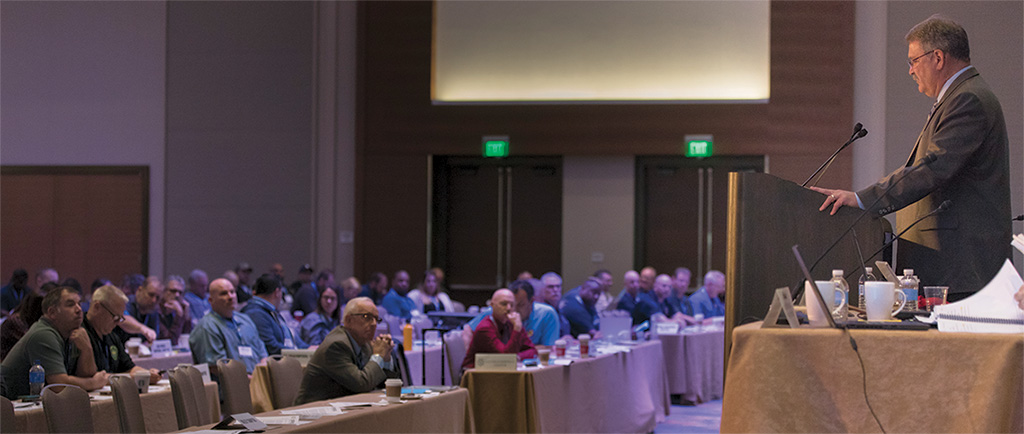
The 2017 Conference of Members was held November 16 to 19 at the Marriott Marquis San Diego, hosted by Region III and chaired by Executive Directors Marshall McClain and Anthony Sanders. Five hundred fifty-three delegates representing 140 associations received important updates on the organization’s activities and member benefits, attended training, networked with colleagues, met with vendors, voted on bylaws and elected executive officers.
With the retirement of President Mike Durant and the election of Brian Marvel in the first contested presidential race in decades, transition and evolution were dominant themes of the Conference, as speakers reflected on PORAC’s progress and looked to its future. Many spoke of the need for the organization — and all of law enforcement — to adapt to changing times and stay ahead of the trends. A repeated refrain was that another pension fight is coming, and pending anti-labor measures threatening other unions mean that PORAC must be prepared to take a leading role. The overall consensus of the presenters, however, was that PORAC remains stable and strong, and continues to grow its influence in advocating for law enforcement on the state and national levels.
Friday, November 17, General Session
The session began with a remembrance of fallen officers and Chaplain Fred Huscher’s moving invocation, following which President Mike Durant announced that Huscher is retiring and will be granted a PORAC lifetime membership.
In his welcome address, Santa Barbara County Sheriff and California State Sheriffs’ Association President Bill Brown discussed the challenges faced by law enforcement in California and across the nation, from the rapid pace of criminal justice reform to unprecedented scrutiny and negative media coverage. While dealing with these issues is difficult, he noted that it provides an opportunity for law enforcement leaders to be adaptable, accountable, innovative and resilient.
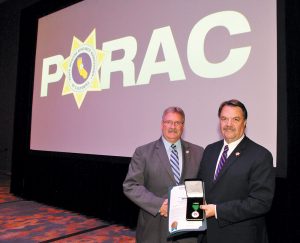
While technology and tactics are constantly changing, “The greatest resource we have is our people,” he said, advising members to “be the best you can be every day that you work, and pay it forward.” He called on law enforcement to be at the forefront of driving positive change, thoughtfully engage with the issues, and shift from defense to offense by proposing legislative solutions and strengthening coalitions between organizations, including management as well as labor associations.
Sheriff Brown concluded with a special tribute to President Durant, presenting him with the Santa Barbara Sheriff’s Department Distinguished Service Medal — only the second time the honor has been awarded. The citation recognized Durant’s “lengthy and exceptional service in a position of great responsibility,” and his many contributions to California law enforcement, PORAC and his department. The members responded with a standing ovation.
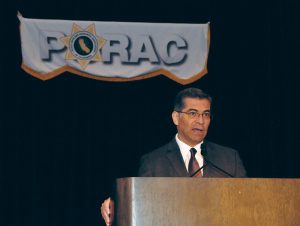
The next guest speaker was California Attorney General Xavier Becerra, who expressed his hope that he could earn the respect and eventually the trust of the state’s peace officers during his tenure in office. He said that while he intends to work with PORAC on many issues, the most important one coming up will be pensions. Mentioning that his father was a construction union member who continues to receive a pension, Becerra stated his commitment to protecting those contracted and earned benefits and encouraged PORAC members to approach him on any issues he might be able to help with.
CalPERS Report: Trustee Priya Mathur reported that CalPERS was able to negotiate the lowest overall premium increase in 20 years for 2018, only 2.33%. A driving factor in containing premium costs was the 2.5% premium decrease in the basic PPO plans due to a value-based purchasing design adopted to encourage members to choose the most appropriate, high-quality and cost-effective providers for common procedures. The Board also renewed its contract to continue CalPERS’ long-term care program for public employees and their family members.
Mathur assured listeners that their pensions are secure. CalPERS investments fund two-thirds of every pension dollar paid out and are key to the system’s long-term success. As part of its efforts to sustain the fund for decades to come, the Board is currently conducting a year-long review of assets, liabilities and the current economic climate to ensure that it has the right mix of allocations. At the end of the last fiscal year, the fund recorded an 11.2% return, which pushed the funding status up three percentage points to 68%. Almost $27 billion of the fund is invested here in California.
Mathur also noted that David Miller was recently elected to the CalPERS Board, and a runoff election is currently underway. After the presentation concluded, President Durant reminded members that PORAC is supporting Michael Bilbrey for re-election to the CalPERS Board.
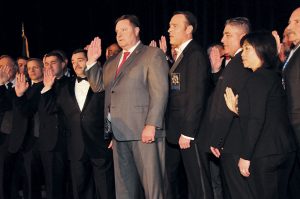
President’s Report: President Durant began by telling members, “What our families go through with us being gone, running our associations, is grueling.” Reflecting on his long service to PORAC, he said he “missed a lot of firsts” with his children, and urged members to keep their families at the forefront of their minds. With his tenure coming to an end, Durant declared, “We need to pass the torch to the next generation, and realize that PORAC will continue to succeed, and be by far the best organization in the United States representing public safety. It has been my honor to work with all of you, and I look forward to the next chapter of PORAC.” After recognizing the great work of PORAC’s legislative advocates, communications team and staff, Durant thanked the members for allowing him to serve for the last 14 years, concluding, “It has been my honor and privilege.”
Vice President’s Report: Noting that PORAC is saying goodbye to another secretary, Vice President Meyer thanked Mike Fender for his work and congratulated him on his pending retirement.
Meyer reported that PORAC membership has grown by more than 4,000 members and over 100 associations in the past four years, and is currently at a record high of 70,195 members in 933 associations. He discussed how a major aspect of recruitment and retention has been ensuring the organization’s professional image through tools such as the website and app, and making sure that all messaging reflects PORAC’s mission of networking, advocacy, image, benefits and training.
National Lobbyist Report: Darryl Nirenberg from Steptoe & Johnson gave an overview of how the Trump administration has been advocating for law enforcement, including changing the composition of the federal courts with pro-law-enforcement appointees, reinstating the surplus military equipment program and requiring the federal government to prosecute those who commit crimes against law enforcement.
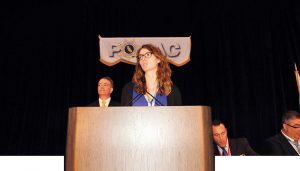
Eva Rigamonti described the firm’s strategy, explaining that the best way to effect policy is to have a seat at the table and explain to lawmakers how their policies impact you. The only way to do that is to build relationships with lawmakers and their staffs. What makes PORAC unique as a law enforcement association is that it is thoughtful and analytical about policy instead of taking black-and-white positions. Congressional offices appreciate that they can consult PORAC for opinions on legislation and receive a constructive response with specific changes.
Looking to the future, Nirenberg said that PORAC’s priorities on the federal level would be promoting the full funding of federal grant programs, as well as ensuring that law enforcement has a front-and-center role in measures to combat the opioid crisis and gang violence. He encouraged members to continue participating in PORAC fly-ins, because traveling across the country to talk about these issues demonstrates their importance to lawmakers.
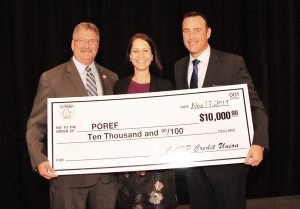
Bylaws Presentation: In addition to the 12 proposed bylaw amendments in the Conference book, two further measures were reviewed. Secretary Fender and Corporate Counsel Bob Bonsall explained a proposed amendment to Bylaw Amendment #2 that would change the president and vice president elections back to a majority vote, establish procedures for a runoff election in case of a tie, move the nominations to the August Board of Directors meeting, start the term of office on January 1, and allow immediate elections if an office is declared vacant at the Conference. A procedural vote was held to replace Bylaw Amendment #2 with the revised version, and the motion passed.
A vote was also held on the exigency of introducing an alternate Bylaw Amendment #8, which would reinstate the additional $2 assessment per member to protect pensions. This time, the funds would not need to come from member dues and could be paid by associations in a lump sum; a majority vote at the 2019 Conference would determine whether it sunsets at that point. In the ensuing discussion, several members voiced support for the amendment, most notably Paul Kelly from San Jose POA, who said that his association would have been devastated by Chuck Reed’s attacks on their pensions had it not been for the support they received from PORAC. Corporate Counsel Bonsall explained the timing of the amendment’s introduction, describing the series of pending court cases that will likely be adverse to unions and weaken the financial resources of PORAC’s union allies in other professions to stave off further pension attacks. The motion to allow the alternate amendment to be voted on the following day carried.
Nominations for President: A motion was made by Jacky Parks to nominate Brian Marvel, seconded by Jack Shaeffer. A motion was made by Tim Davis to nominate Brent Meyer, seconded by Peter Durfee. Both nominations were accepted by the candidates.
Nominations for Treasurer: The nomination of Marcelo Blanco was made, seconded and accepted. There were no other nominations.
Training: On Friday and Saturday afternoons, Rick Braziel presented a two-part POST-certified class entitled “The Future of Policing.” The class centered on analyzing lessons learned from the law enforcement response to a number of critical incidents in recent years — including the Christopher Dorner manhunt, Ferguson riots, Stockton bank robbery and San Bernardino terrorist attack — followed by a panel discussion of experts in the field to examine how such events create trends and how law enforcement can get ahead of those trends.
Saturday, November 18,
General Session
Bylaws: A region vote was held to accept all the bylaw amendments as written. All regions voted yes except Region II, which did not have a position on Amendment #2. A chapter vote was held for Region II on the amendment, with all chapters voting yes except Valley Chapter, which did not have a position. A roll call vote was then held for the associations in Valley Chapter. The final vote total satisfied the two-thirds majority requirement, so all bylaws were passed.
Election of President: In the roll call vote, 9,816 votes were cast for Brent Meyer and 28,557 for Brian Marvel. In his acceptance speech, Marvel expressed excitement about what PORAC can accomplish in the next few years and promised, “Whether you’re from a small, medium or large association, Northern, Central or Southern California, you should know that PORAC will be working every day on your behalf in Sacramento and Washington, D.C.” Crediting his success to teamwork, he concluded, “Now is the time for unity. We must come together to fight this battle that we know is coming. Thank you for all of your support; let’s get to work.”
Election of Treasurer: Marcelo Blanco was elected Treasurer by voice vote.
Legislative Report: Reiterating the warning that a pension battle is coming, possibly via a statewide ballot measure as well as on a city-by-city basis, Aaron Read praised the members’ decision to pass the new assessment to raise funds for the fight. Reviewing the legislative year, he said, “We’ve had to redefine victory. Victory in the old days was how many bills we could get signed into law. Now we’re looking at a new definition of victory — keeping some of these bad bills from passing. And we’ve done a good job of that.” Since there is another year left in the session, however, he explained that some of these bills are technically still alive and will have to be fought again in 2018. Next year also promises to be busy politically, with a number of statewide races, including U.S. Senate and governor.
Randy Perry reminded the audience that the Board of Directors will hold its endorsement meetings in January, so members should communicate their opinions at chapter meetings to be passed along to the Board. Perry gave an overview of several bills that PORAC successfully opposed, as well as pointing out that PORAC drafted three bills in the past three years related to transparency and body cameras.
Marketplace Communications: Pat Moran stated that in the face of the “unending, unprecedented media onslaught” against law enforcement, mostly from people who don’t understand what officers do on a daily basis, “PORAC remains a voice of reason and experience.” He described how MPC helps get PORAC’s voice out through op-eds, letters to the editor, press releases and statements such as the recent one on the Las Vegas shooting. He also gave an overview of the videos produced for PORAC by MPC Studios, showing examples of a legislative video, a short member story and a TV campaign commercial.
Michele Cervone spoke about PORAC’s social media efforts, which focused this year on engagement and encouragement by sharing stories of positive law enforcement activities in communities.
POST Report: Executive Director Manny Alvarez gave an overview of what members can expect in the next six to 12 months. POST has undertaken a number of automation initiatives, among them a website redesign to help users find information, with automated training reimbursement forms and enhanced online training — including testing of 15- to 30-minute courses for CPT credits. POST also plans to add some topics to regular basic training, such as first aid, rifle training, communications skills and procedural justice. FTOs will be incorporated into the training development. POST has received many requests for wellness and critical incident recovery training, but is still struggling with how best to deliver this.
Treasurer’s Report: Treasurer Blanco reported that PORAC did well in this year’s audit. Kim Busman handled the sale of the PORAC house and purchased two condos with the proceeds, one for the president and one for the vice president.
PORAC’s money manager, Mark Sikorski from UBS, reported that PORAC’s accounts are currently around $9 million, with 25% in bonds and 75% in equities. Year to date the accounts are up 17%, keeping pace with the S&P 500.
Treasurer Blanco pointed out that $3 million of PORAC’s $9 million is the PIC account from the last voluntary dues increase, which Sikorski helped invest in a money market account so that it can generate interest while still being available when needed. “This financial team is constantly working to do what’s right and to make sure that this organization is fruitful and keeps moving forward,” Blanco concluded.
LDF Report: Chairman Fred Rowbotham reported that LDF continues to grow fantastically, with 121,630 participants in 1,259 associations in 42 states and four territories. “We always say we never have to go seeking members; they come to us. The benefit sells itself,” he stated. The growth means the fund is also fiscally strong, having reached a milestone of $25 million in net assets, and it has paid more than $140 million in benefits. Accountability continued to be a theme this year; the trustees removed a panel attorney in another state who violated LDF’s standards and also instituted the first year of attorney audits, which resulted in a clean bill of health for the two firms that were audited. Two more firms will be audited in 2018. The fund continues to see the most active prosecutions of members in its history, with 64 active criminal cases currently pending.
Insurance & Benefits Trust: Chairman Damon Kurtz reported that the Trust is growing due to provisions in the ACA and will be adding several new employees. Year to date, the Trust has paid out a total of more than $114 million in benefits in the long-term disability plan. Kurtz also addressed the fact that the Trust’s disability rates are going up by 30%. He explained that the increase was passed along by the Trust’s insurance provider, and despite going through a bid process the Trust was unable to find a better provider, but that having the Trust fully insured helps protect member benefits. In closing, he asked that members continue to hold the trustees accountable and approach them with any questions or feedback.
Retiree Medical Trust: “The Trust is running on all cylinders,” Chairman Terry Moore reported, adding that it continues to grow and achieve its financial benchmarks, with a current total of $34.4 million in the bank and a recent successful audit. The Trust also plans to improve its website in the coming year.
Labor and Training: Labor Consultant Claude Alber reported that the 2018 training calendar has been set, except the PAC class, which is still to be scheduled. A new media class is being planned. PORAC requested POST certification for all its classes, but POST declined to certify Basic Collective Bargaining, Leadership, and Political Action because the courses didn’t relate closely enough to law enforcement activities. However, Alber pointed out that the class being offered at Conference is POST-certified, and all the Symposium classes will be as well.
Saturday Installation Dinner
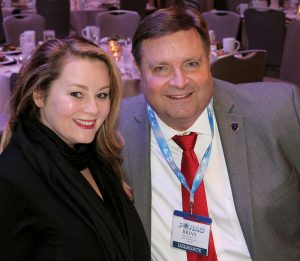
The banquet was marked by heartfelt testimonials to the career, contributions and character of President Durant, including tributes from Randy Beintema, Bob Bonsall, Ed Fishman, and Aaron Read and Randy Perry, who presented Durant with a State Senate resolution in his honor from Senator Andy Vidak (who, coincidentally, played basketball with Durant when they were students at Redwood High School). Lifetime memberships in PORAC were presented to Durant and RMT Chairman Terry Moore. After the awards and the swearing-in of the new Board and trustees, comedian Adam Ferrara entertained the audience with his hilarious standup routine.
Len Delaney Award
| Laren Leichliter |
Distinguished Service
| Mike Fender | Jon Rudolph |
| James Gonzales | Shane Stiles |
| Mike McGrew | Ernie Susi |
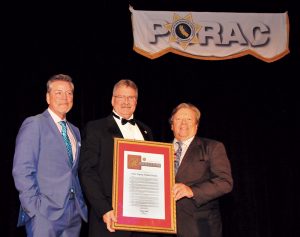
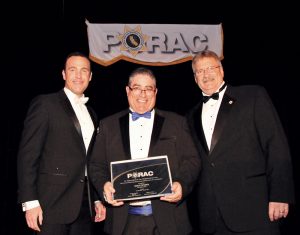
Sunday, November 19, General Session
Memorial Foundation: President Durant reminded the audience about the importance of funding the California Peace Officers’ Memorial Ceremony by supporting the Foundation, and urged every association to make an annual donation. As a new way to raise funds, CPOMF has begun the process of getting the state DMV to offer a special peace officers’ memorial license plate. They will need to sell 7,500 in two years, so Durant encouraged members to promote the plates to family, friends and other supporters.
RAM Report: Chairman Bob Valladon informed attendees that it costs just $90 per year to become a retired associate member and receive LDF firearms coverage, an invaluable benefit. He asked association leaders to remind all their retirees to sign up for RAM.
SPAC Report: Chairman P.J. Webb said that SPAC consists of 120 associations representing 830.1 members. He reported that the coalition is currently working on legislation expanding workers’ comp presumptions and thanked PORAC associations that provided letters of support in this effort.
Scholarship Committee: Chairman Randy Beintema reminded members that none of their regular PORAC dues go to support scholarships or the Memorial Foundation; rather, these are funded by an optional voluntary donation, which he encouraged all to make. He reported that scholarship applications will open in January; a record-high number of applications were received last year, but 33% had to be denied because they were incomplete or did not follow directions. He also noted that the application will change this year, with a new essay question that asks students what role a member of law enforcement has played in shaping their future.
With no other business, President Durant adjourned the session and said his farewells, concluding this especially momentous Conference of Members.
